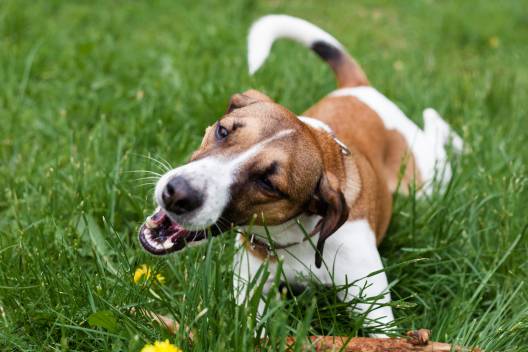Connect with a verified veterinarian in minutes. Licensed vets are available 24/7 to answer your questions. No need to worry about your furry family member.
Dogs that have an itchy butt will usually drag it along the floor in an attempt to relieve the itch. This is often referred to as “scooting.” While this behavior might appear comical to us, it is uncomfortable for your dog. So, it is important to try and determine what the cause is – your dog will thank you for it! But what can cause a dog to have an itchy butt?
Signs of an itchy butt
As already mentioned, the most common sign of an itchy butt is your dog dragging his behind along the floor. You might also notice your dog licking their butt excessively. With female dogs, it can be difficult to distinguish whether she’s licking her butt or her vulva, which can indicate a different issue entirely. Speak to your veterinarian if you are unsure.
If your dog has an itchy butt, you might also notice redness, hair loss, or sore skin around their anus, even if you do not actually see them scooting or licking.
Reasons that might cause your dog to have an itchy butt
Skin allergies
Dogs can be allergic to all sorts of things, the most common being food ingredients, pollen, and other environmental allergens such as dust mites. An allergy will usually cause your dog to become itchy all over their skin, sometimes including their butt. Dogs can develop allergies at any age, so it can be difficult to find out what your dog is allergic to. Your veterinarian will be able to help you with this, often by performing tests such as skin tests, blood tests, or diet trials.
Anal glands
Dogs have two scent glands in their bottom, one on either side of their anus. These contain a smelly fluid that usually empties when your dog poops, providing a way for your dog to scent-mark. These glands can sometimes become impacted with excess fluid if they don’t empty properly. This is very uncomfortable for your dog, and you might see him scooting or licking his butt excessively in an attempt to alleviate his discomfort.
If left untreated, impacted anal glands can sometimes become infected and may even form an abscess, which can burst out near your dog’s anus. If this happens, you might see an unpleasant bloody or pus discharge near your dog’s bottom.
Often, the cause of anal gland troubles in dogs is unknown but soft stools can make them more prone to impaction. If your dog regularly has soft stools, then consider feeding them a different diet or giving them a nutritional supplement such as organic pumpkin powder for dogs. Always check with your veterinarian before giving anything new to your dog, just in case it isn’t suitable for him.
Skin infection
The skin around your dog’s anus can become infected either from a wound, excessive licking, or if feces have become stuck around his butt. This can cause the skin to become inflamed and irritated, which might result in your dog licking or chewing at it even more.
Intestinal parasites
Tapeworm is a common reason for your dog to have an itchy butt. You might see tapeworm segments in their feces or around their anus that look like tiny white grains of rice.
Infections with other intestinal worms such as roundworm, hookworm, and whipworm might also cause your dog to lick his bottom more than usual. However, these aren’t usually as irritating as tapeworm.
External parasites
Parasites that live on your dog’s skin, such as fleas, mites, or lice, might cause your dog to be itchy all over his body, including his butt. Fleas, in particular, are very common, so speak to your veterinarian about a preventative treatment program for your dog.

Review symptoms, medications & behavior to keep your pets healthy with a Vet Online in just minutes.
Ask a Vet Live NowWhen should I call the veterinarian?
You should speak to your veterinarian if your dog seems uncomfortable or if they are scooting, licking, or chewing his butt a lot. The occasional scoot along the floor or lick of his butt can be normal and is probably just a sign that your dog had a temporary itch in that area. Anything more than that probably means that something is wrong, and you should take your dog to get them checked out.
What is the treatment for my dog’s itchy butt?
Treatment will depend on the cause of your dog’s itchy butt. If your dog has a skin allergy, then the most obvious treatment is for them to avoid the allergen completely, for example, by removing it from their diet. However, this might not always be possible, particularly if they have an allergy to something in the environment. For these dogs, various medications can be prescribed by your veterinarian to help alleviate the itch.
If your dog has impacted anal glands, your veterinarian will be able to empty them and provide immediate relief for your dog. If they are infected, your dog might also need a course of antibiotics and an anti-inflammatory.
If your dog has worms or fleas, then a simple course of treatment can eliminate them and make your dog more comfortable.
What can I do to stop my dog from getting an itchy butt?
The best thing you can do is work with your veterinarian to get to the bottom of your dog’s itch (no pun intended!). If your dog is prone to problems with his anal glands, then taking them for regular checks can help prevent any issues. You can also try using supplements in their diet, which may help.
If allergies or an infection are to blame, make sure your dog gets any medications that your veterinarian prescribes. You should also make sure that your dog is treated regularly for fleas and worms.
Conclusion
All dogs will occasionally lick their bottom, and some might even scoot every now and then as a one-off. But if your dog is scooting their bottom repeatedly, or licking or chewing it excessively, then it is likely they have an itchy butt. This indicates that there is a problem, so take him to get checked out by a veterinarian. Skin allergies, impacted anal glands, or parasites such as fleas or worms could be to blame, and all require treatment to remove any discomfort.
Connect with a verified veterinarian in minutes. Licensed vets are available 24/7 to answer your questions. No need to worry about your furry family member.

Gemma Cliffin BSC BVSC MRCVS
This article has been reviewed and approved by an independent Veterinarian: Dr Gemma Cliffin MRCVS is an experienced small animal vet who combines her love of writing alongside working in practice. Since her graduation from the University of Liverpool in 2014 she has worked in a wide variety of roles including first opinion practice, as a night vet and as a locum vet. She has also spent time working at a charity clinic in the Cook Islands which was a challenge but also immensely rewarding. She loves all aspects of veterinary work, but she especially enjoys medicine cases and diagnostic imaging. She is passionate about pain-management, particularly in her more senior patients. She currently works in a first opinion small animal practice in North Yorkshire where she deals with both routine and emergency cases.
Review symptoms, medications & behavior to keep your pets healthy with a Vet Online in just minutes.
Ask a Vet Live Now

